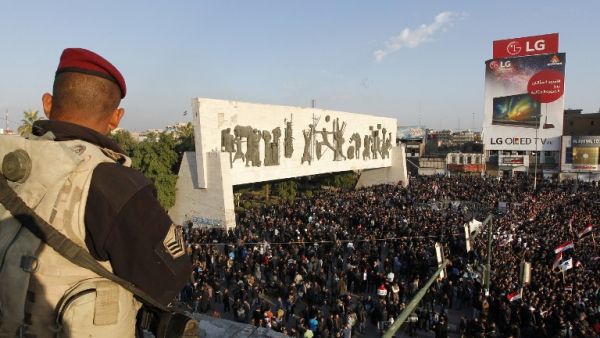Iraqi supporters of Shia cleric Moqtada al-Sadr face yet another barrier to their protests calling for electoral reform, after both the United Nations and France issued condemnatory statements earlier this week.
Sadr and his followers are demanding an overhaul of Iraq’s Independent High Electoral Commission (IHEC), which they describe as corrupt and biased. However, critics have suggested that Sadr’s political ambitions in the upcoming provincial and parliamentary elections drive his campaign.
Five demonstrators and a policeman died in clashes during a large protest in Baghdad last Saturday. Iraqis shared images of the violence on social media, using them as yet more ammunition in their critique of the country’s government:
Photos from the events of today's demonstrations in Baghdad! Who bears the responsibility? Is the electoral commission worth all this blood? A government that kills its people certainly certainly does worse than that with the past, present and future of the country.
However, following Saturday’s confrontations, Sadr’s supporters have now come up against a different kind of obstacle: international condemnation.
On Monday, the French Foreign Ministry issued a statement saying “France condemns the violence committed on the edges of the demonstrations in Baghdad which caused several deaths and numerous injuries.”
“France equally condemns the rocket fired which hit the Green Zone in Baghdad on the same day,” the statement added, calling on the government of Haider al-Abadi to launch an inquiry into the incidents.
The statement also expressed full support for Iraq’s government.
French President Francois Hollande has been an ally to Abadi, making a visit to Baghdad last month in order to offer his encouragement for ongoing military efforts against Daesh in the north of country.
Meanwhile, the United Nations has voiced its support for Iraq’s electoral commission. Ján Kubiš, Special Representative of the UN Secretary-General for Iraq, held a meeting on Monday with members of the commission, asserting the UN’s continued backing for its work.
“The IHEC is one of the core elements of the democratic and constitutional order in Iraq,” Kubiš explained. “The government of Iraq must provide it with all the necessary support and protection for the IHEC to be able to function effectively up until it is replaced as a result of democratic and legal process.”
The IHEC has denied claims by Sadr’s supporters that it is unfit to carry out its function supervising elections due to suggestions of vested interests in the major political parties. Senior officials have insisted that they will resist attempts to force changes to the IHEC ahead of provincial elections in September and a parliamentary vote in 2018.
RA







